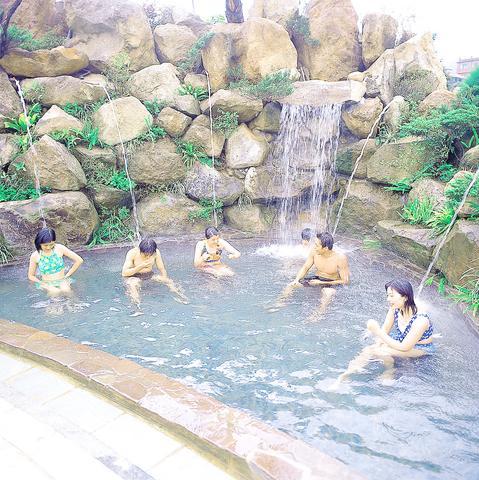As SARS continues to upset the routines of everyday life and people stay at home rather than risk going out, many businesses are suffering from the effects of the pernicious disease.
Dimmed by the market slowdown, a number of local companies are now coming up with all kinds of bright ideas in the hope of offsetting their losses.

PHOTO COURTESY OF TIEN LAI SPRING RESORT
The familiar practice of low pricing has been effective in bringing back some customers, but hot spring resorts have gone a step further with their claims that a soak in a hot spring pool is so good for you it can boost the immune system and help defend the body against SARS.

PHOTO COURTESY OF TIEN LAI SPRING RESORT
Lucy Lee (
A different tack has been taken by two resorts on Yangmingshan, at Peitou (北投) and Kinshan (金山). They are trying to attract the general public by promoting the idea that one of the most effective ways of beating SARS is to take a healthy hot spring, away from the disease's hot spots in the city and enjoy gourmet food at a scenic hideaway.
As a result of these promotional efforts, or perhaps because they are ready to get back to normal life, people in Taipei have responded to the calls of the hot spring owners, as the large number of visitors to resort hotels on Yangminshan last weekend showed.
The hot springs in these areas mostly originate from the Tatun mountain range (
Bathing in hot springs is a favorite leisure activity of many Taiwanese that was picked up from the Japanese during the 50-year colonial-rule period beginning in 1895. In Japan the merits of taking a daily dip in the hot spring have been preached like a gospel since the eighth century.
The story goes that Taiwan first acquired the habit when a Japanese businessman from Osaka, named Hirada Gengo (
In addition to Peitou and Yangmingshan, Guanziling (
The hot spring waters in Peitou belong to the acid sulfur type, which are quite different from the nearby springs in Yangmingshan, which contain a weak alkali type of water. In Guanziling, however, the spring water carries alkali and salt, whereas in Sichongxi the water is distinguished by its weak alkali and carbonic acid content.
Hot spring resorts have also developed in Wulai (
All hot spring resorts claim their spring waters have extraordinary healing effects, such as improving skin tone, increasing circulation and digestion, as well as other functions of the body. Also, many scientists have confirmed the beneficial effects of bathing in hot springs.
One thing is certain, however, and that is, when a person relaxes in a hot spring pool, natural or suffused with fragrance, the comfort naturally brings forth a refreshing effect, spiritual and physical, against which little else can compete.

In the March 9 edition of the Taipei Times a piece by Ninon Godefroy ran with the headine “The quiet, gentle rhythm of Taiwan.” It started with the line “Taiwan is a small, humble place. There is no Eiffel Tower, no pyramids — no singular attraction that draws the world’s attention.” I laughed out loud at that. This was out of no disrespect for the author or the piece, which made some interesting analogies and good points about how both Din Tai Fung’s and Taiwan Semiconductor Manufacturing Co’s (TSMC, 台積電) meticulous attention to detail and quality are not quite up to

April 21 to April 27 Hsieh Er’s (謝娥) political fortunes were rising fast after she got out of jail and joined the Chinese Nationalist Party (KMT) in December 1945. Not only did she hold key positions in various committees, she was elected the only woman on the Taipei City Council and headed to Nanjing in 1946 as the sole Taiwanese female representative to the National Constituent Assembly. With the support of first lady Soong May-ling (宋美齡), she started the Taipei Women’s Association and Taiwan Provincial Women’s Association, where she

Chinese Nationalist Party (KMT) Chairman Eric Chu (朱立倫) hatched a bold plan to charge forward and seize the initiative when he held a protest in front of the Taipei City Prosecutors’ Office. Though risky, because illegal, its success would help tackle at least six problems facing both himself and the KMT. What he did not see coming was Taipei Mayor Chiang Wan-an (將萬安) tripping him up out of the gate. In spite of Chu being the most consequential and successful KMT chairman since the early 2010s — arguably saving the party from financial ruin and restoring its electoral viability —

It is one of the more remarkable facts of Taiwan history that it was never occupied or claimed by any of the numerous kingdoms of southern China — Han or otherwise — that lay just across the water from it. None of their brilliant ministers ever discovered that Taiwan was a “core interest” of the state whose annexation was “inevitable.” As Paul Kua notes in an excellent monograph laying out how the Portuguese gave Taiwan the name “Formosa,” the first Europeans to express an interest in occupying Taiwan were the Spanish. Tonio Andrade in his seminal work, How Taiwan Became Chinese,